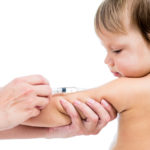
Pediatric specialists from The Childrenâs Hospital at Sacred Heart are encouraging community members to vaccinate themselves and their children to protect against a measles outbreak, which has infected more than 100 people across 14 states. In the past two weeks, four cases of measles have been diagnosed in people who traveled to, but are not residents of, Florida.
âThis is an extremely contagious disease with serious risks for complications, hospitalization and even death,â said Dr. Robert Patterson, medical director of The Childrenâs Hospital at Sacred Heart. âPlease do your part to protect the health of our children and our entire community, especially the most vulnerable.â
The hospitalâs announcement follows recommendations of the Centers for Disease Control and Prevention (CDC), where scientists and public health officials across the nation are arguing in favor of vaccinations. Although measles was considered eliminated from the U.S. in 2000, a community becomes less protected against the disease once the vaccination rate dips below 95 percent. The majority of people with the disease in the most recent outbreak were not vaccinated, and 91 of the confirmed cases are in California, where the population is especially vulnerable to measles due to a low vaccination rate of 92 percent.
Similar to California, Florida also reports a vaccination rate of about 92 percent of school-age children. This, combined with the stateâs heavy rate of tourism, could potentially put community members at risk for measles exposure. People who are unvaccinated for any reason, including those who refuse vaccination, risk getting infected with measles and spreading it to others, particularly those who cannot get vaccinated because they are too young or have specific health conditions, such as a weakened immune system.
Measles â listed by the CDC as one of the most infectious diseases in the world â is a respiratory disease that spreads through the air, particularly through coughing and sneezing. Early-stage symptoms include a fever, runny nose, cough, red eyes and sore throat. This is followed by a rash that spreads all over the body.
About 30 percent of those infected with measles will develop one or more complications, including pneumonia, ear infections or diarrhea. For children, complications may be even more serious and include long-term brain damage and deafness. If vaccinations were stopped, about 2.7 million deaths from measles could be expected each year worldwide, according to the CDC.
Administered in two doses, the measles vaccine is very effective. One dose is about 93 percent effective at preventing measles, and two doses are about 97 percent effective. Of the 3 percent of measles cases developed in people who are fully vaccinated, these typically involve a milder illness and are less likely to spread to others. The vaccine is good for life, without need for a booster dose.
Many studies, to date, have examined and continuously shown that vaccines are not associated with autism. The American Academy of Pediatrics (AAP), the American Medical Association (AMA), the CDC and the Institute of Medicine (IOM) agree that scientific research does not support a link between vaccines and autism.
To receive a measles vaccine, see your primary care physician or your childâs pediatrician. The measles vaccine is also available at many local pharmacies and clinics, including the Immunization Clinics for the Florida Department of Health in Escambia and Santa Rosa Counties.